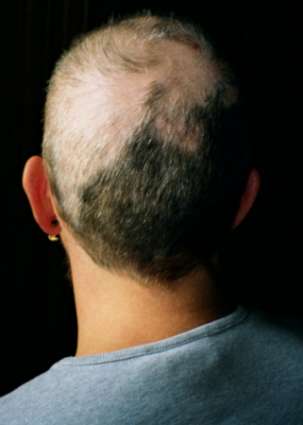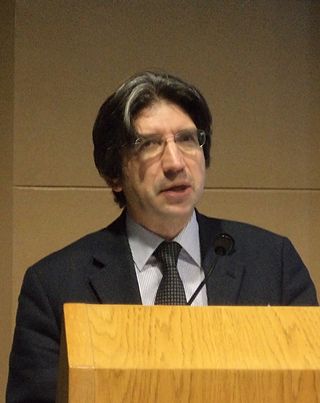Related Research Articles

Anxiety is an emotion which is characterised by an unpleasant state of inner turmoil and includes feelings of dread over anticipated events. Anxiety is different from fear in that fear is defined as the emotional response to a present threat, whereas anxiety is the anticipation of a future one. It is often accompanied by nervous behavior such as pacing back and forth, somatic complaints, and rumination.

Cognitive behavioral therapy (CBT) is a form of psychotherapy that aims to reduce symptoms of various mental health conditions, primarily depression, PTSD and anxiety disorders. Cognitive behavioral therapy focuses on challenging and changing cognitive distortions and their associated behaviors to improve emotional regulation and develop personal coping strategies that target solving current problems. Though it was originally designed to treat depression, its uses have been expanded to include many issues and the treatment of many mental health and other conditions, including anxiety, substance use disorders, marital problems, ADHD, and eating disorders. CBT includes a number of cognitive or behavioral psychotherapies that treat defined psychopathologies using evidence-based techniques and strategies.

Trichotillomania (TTM), also known as hair-pulling disorder or compulsive hair pulling as well as ttm, is a mental disorder characterized by a long-term urge that results in the pulling out of one's own hair. A brief positive feeling may occur as hair is removed. Efforts to stop pulling hair typically fail. Hair removal may occur anywhere; however, the head and around the eyes are most common. The hair pulling is to such a degree that it results in distress and hair loss can be seen.
Trichophagia is a form of disordered eating in which persons with the disorder suck on, chew, swallow, or otherwise eat hair. The term is derived from ancient Greek θρίξ, thrix ("hair") and φαγεῖν, phagein. Tricho-phagy refers only to the chewing of hair, whereas tricho-phagia is ingestion of hair, but many texts refer to both habits as just trichophagia. It is considered a chronic psychiatric disorder of impulse control. Trichophagia belongs to a subset of pica disorders and is often associated with trichotillomania, the compulsive pulling out of ones own hair. People with trichotillomania often also have trichophagia, with estimates ranging from 48-58% having an oral habit such as biting or chewing, and 4-20% actually swallowing and ingesting their hair. Extreme cases have been reported in which patients consume hair found in the surrounding environment, including other people's and animals' hair. In an even smaller subset of people with trichotillomania, their trichophagia can become so severe that they develop a hairball. Termed a trichobezoar, these masses can be benign, or cause significant health concerns and require emergency surgery to remove them. Rapunzel syndrome is a further complication whereby the hairball extends past the stomach and can cause blockages of gastrointestinal system.
Generalized anxiety disorder (GAD) is a mental and behavioral disorder, specifically an anxiety disorder characterized by excessive, uncontrollable and often irrational worry about events or activities. Worry often interferes with daily functioning, and individuals with GAD are often overly concerned about everyday matters such as health, finances, death, family, relationship concerns, or work difficulties. Symptoms may include excessive worry, restlessness, trouble sleeping, exhaustion, irritability, sweating, and trembling.
Rapunzel syndrome is an extremely rare intestinal condition in humans resulting from ingesting hair (trichophagia). The syndrome is named after the long-haired girl Rapunzel in the fairy tale by the Brothers Grimm. Trichophagia is sometimes associated with the hair-pulling disorder trichotillomania. This syndrome is a rare and unusual form of trichobezoar. Since 1968, there have been fewer than 40 documented cases in the literature. This syndrome occurs when the trichobezoar (hairball) reaches past the small intestine, and sometimes even into the colon producing a long tail-like extension of hair.
Stereotype threat is a situational predicament in which people are or feel themselves to be at risk of conforming to stereotypes about their social group. It is theorized to be a contributing factor to long-standing racial and gender gaps in academic performance. Since its introduction into the academic literature, stereotype threat has become one of the most widely studied topics in the field of social psychology.

Excoriation disorder, more commonly known as dermatillomania, is a mental disorder on the obsessive–compulsive spectrum that is characterized by the repeated urge or impulse to pick at one's own skin, to the extent that either psychological or physical damage is caused.

Dan Joseph Stein is a South African psychiatrist who is a professor and Chair of the Dept of Psychiatry and Mental Health at the University of Cape Town, and Director of the South African MRC Unit on Risk & Resilience in Mental Disorders. Stein was the Director of UCT's early Brain and Behaviour Initiative, and was the inaugural Scientific Director of UCT's later Neuroscience Institute. He has also been a visiting professor at Mount Sinai School of Medicine in the United States, and at Aarhus University in Denmark.

Mental distress or psychological distress encompasses the symptoms and experiences of a person's internal life that are commonly held to be troubling, confusing or out of the ordinary. Mental distress can potentially lead to a change of behavior, affect a person's emotions in a negative way, and affect their relationships with the people around them.
The Anxiety and Depression Association of America (ADAA) is a U.S. nonprofit organization located in Silver Spring, Maryland dedicated to increasing awareness of and improving the diagnosis, treatment, and cure of anxiety disorders in children and adults. The organization is involved in education, training, and research for anxiety and stress-related disorders. Their mission statement is to promote the prevention, treatment, and cure of anxiety, depression, and other stress-related disorders through education, practice, and research.

Obsessive–compulsive disorder (OCD) is a mental and behavioral disorder in which an individual has intrusive thoughts and feels the need to perform certain routines (compulsions) repeatedly to relieve the distress caused by the obsession, to the extent where it impairs general function.

Social anxiety disorder (SAD), also known as social phobia, is an anxiety disorder characterized by sentiments of fear and anxiety in social situations, causing considerable distress and impairing ability to function in at least some aspects of daily life. These fears can be triggered by perceived or actual scrutiny from others. Individuals with social anxiety disorder fear negative evaluations from other people.

David F. Tolin is an American clinical psychologist.
Minority stress describes high levels of stress faced by members of stigmatized minority groups. It may be caused by a number of factors, including poor social support and low socioeconomic status; well understood causes of minority stress are interpersonal prejudice and discrimination. Indeed, numerous scientific studies have shown that when minority individuals experience a high degree of prejudice, this can cause stress responses that accrue over time, eventually leading to poor mental and physical health. Minority stress theory summarizes these scientific studies to explain how difficult social situations lead to chronic stress and poor health among minority individuals.
Janet Allison Taylor Spence was an American psychologist who worked in the field of the psychology of anxiety and in gender studies.
John Piacentini, PhD, ABPP, is an American clinical child and adolescent psychologist, and professor of psychiatry and biobehavioral sciences at the David Geffen School of Medicine at UCLA in Los Angeles, California. He is the director of the Center for Child Anxiety, Resilience, Education and Support (CARES), and the Child OCD, Anxiety and Tic Disorders Program at UCLA's Semel Institute for Neuroscience and Human Behavior.
Jerilyn Ross was an American psychotherapist, phobia expert, and mental health activist. The New York Times' Benedict Carey described her as "one of the country’s most visible and effective advocates for those with mental health problems."

The COVID-19 pandemic has impacted the mental health of people across the globe. The pandemic has caused widespread anxiety, depression, and post-traumatic stress disorder symptoms. According to the UN health agency WHO, in the first year of the COVID-19 pandemic, prevalence of common mental health conditions, such as depression and anxiety, went up by more than 25 percent. The pandemic has damaged social relationships, trust in institutions and in other people, has caused changes in work and income, and has imposed a substantial burden of anxiety and worry on the population. Women and young people face the greatest risk of depression and anxiety. According to The Centers for Disease Control and Prevention study of Mental Health, Substance Use, and Suicidal Ideation During the COVID-19 Pandemic, "63 percent of young people reported experiencing substantial symptoms of anxiety and depression".
Kalimah Johnson is a therapist and clinical social worker who specializes in cultural-specific holistic healing. She is the founder and executive director of the SASHA Center in Detroit, Michigan and has been influential in the #MeToo movement.
References
- ↑ "University of Wisconsin". University of Wisconsin-Madison. Retrieved June 7, 2021.
- 1 2 3 4 "Kent State Professor Profile". Kent State. Retrieved June 9, 2021.
- ↑ "ADAA Profile". Anxiety and Depression Association of America. Retrieved June 9, 2021.
- ↑ "Jerilyn Ross Clinician Advocate Award". Anxiety & Depression Association of America. Retrieved June 7, 2021.
- ↑ "Book Review". Researchgate. Retrieved June 7, 2021.
- ↑ "Acting White". Wkyc Studios. August 3, 2017. Retrieved June 7, 2021.
- ↑ "Black Women Are Facing an Overwhelming Mental Health Crisis". Prevention. November 6, 2020. Retrieved June 7, 2021.
- ↑ "Sister Circles Workshop Press Release". PR Newswire (Press release). Retrieved June 7, 2021.
- 1 2 "NPR Teen Anxiety On The Rise". wbur. October 19, 2017. Retrieved June 8, 2021.
- ↑ "Forbes Article". Forbes. Retrieved June 8, 2021.